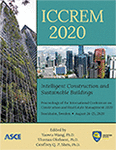International Conference on Construction and Real Estate Management 2020
Analysis of the Evolutionary Equilibrium Strategy of Infrastructure Engineering Safety Supervision Based on Prospect Theory
Publication: ICCREM 2020: Intelligent Construction and Sustainable Buildings
ABSTRACT
As the construction technology of infrastructure engineering are complex and the interest subjects are multivariate, the safety accidents are likely to occur in the construction when lack of supervision. In order to reduce the frequency of safety accidents, it is necessary to establish effective supervision mechanism. Based on the prospect theory, this paper constructs the evolution game model of infrastructure engineering safety supervision, then analyzing the interactive mechanism of supervision behavior of main interest subjects, and studying the factors affecting the evolution of the system. The results show that the stable state of infrastructure engineering safety supervision system is affected by management cost, penalty intensity, and accident loss. Through analysis, government should improve the punishment and establish effective restraint mechanism, as well as clarify the regulatory responsibilities of all subjects. Besides, supervision units can improve supervision efficiency through technological innovation to reduce the probability of accidents, and guarantee the quality and safety of infrastructure projects.
Get full access to this article
View all available purchase options and get full access to this chapter.
REFERENCES
Cheng, M. and Chen, H. (2011). “Research on construction safety supervision based on evolutionary game theory.” Operations Research and Management Science, 20(6), 210-215. (in Chinese).
Friedman, D. (1991). “Evolutionary games in economics.” Econometrica, 59(3), 637.
Gao, M., Guo, S.H. and Xia, L.L. (2016). “The formation and stability of cooperation management alliance of air pollution control among local governments: based on the evolutionary game.” Chinese Journal of Management Science, 24(8), 62-70. (in Chinese).
Guttman, J.M. (2000). “On the evolutionary stability of preferences for reciprocity.” European Journal of Political Economy, 16(1), 31-50.
Huang, D.X. and Wu, Y.J. (2016). “Evolutionary model for coal mine safety supervision considering change in population quantity.” China Safety Science Journal, 26(10), 145-150. (in Chinese).
Kahneman, D. and Tversky, A. (2000). Choices, values, and frames, Cambridge University Press, England.
Lei, X.P. and Qiu, G.H. (2016). “Evolutionary game analysis on behavior supervision of food industry based on prospect theory.” Systems Engineering, 34(2), 82-88. (in Chinese).
Liu, R.J., Sun, B. and Liu, D.H. (2015). “Analysis of government management in the network mass incidents based on evolutionary game theory.” Chinese Journal of Management, 12(6), 911-919. (in Chinese).
Smith, J.M. and Price, G.R. (1973). “The logic of animal conflict.” Nature, 246(5427), 15-18.
Taylor, P.D. and Jonker, L.B. (1978). “Evolutionary stable strategies and game dynamics.” Mathematical Biosciences, 40(1-2), 145-156.
Wan, X.Y., Long, Y. and Jiang, T. (2018). “Public participation, government regulation and the dynamic evolution research into mobile application security management.” Operations Research and Management Science, 27(11), 50-60. (in Chinese).
Wang, X.F., Liu, Y., Qiu, K.N. and Shen, F.M. (2016). “Research on evolutionary game for construction workers participation in safety management.” China Safety Science Journal, 26(4), 150-154. (in Chinese).
Zheng, J.J., Han, X. and Zou, Z.X. (2015). “Prospect theory embedded evolutionary stability analysis on bidding strategies of heterogeneous bidders in equity auction.” Journal of Industrial Engineering and Engineering Management, 29(4), 109-116. (in Chinese).
Zhou, G.H., Zhang, Y., Li, Y.L. and Zhao, G.T. (2012). “Evolutionary game analysis of behavior construction safety management based on prospect theory.” Journal of Systems and Management, 21(4), 501-509. (in Chinese).
Zhu, L.L. and Sun, S.H. (2019). “Tripartite evolution game and simulation analysis of food quality and safety supervision under consumer feedback mechanism.” Journal of Chongqing University (Social Science Edition), 25(3), 94-107. (in Chinese).
Information & Authors
Information
Published In
ICCREM 2020: Intelligent Construction and Sustainable Buildings
Pages: 574 - 582
Editors: Yaowu Wang, Ph.D., Harbin Institute of Technology, Thomas Olofsson, Ph.D., Luleå University of Technology, and Geoffrey Q. P. Shen, Ph.D., Hong Kong Polytechnic University
ISBN (Online): 978-0-7844-8323-7
Copyright
© 2020 American Society of Civil Engineers.
History
Published online: Oct 14, 2020
Published in print: Oct 14, 2020
Authors
Metrics & Citations
Metrics
Citations
Download citation
If you have the appropriate software installed, you can download article citation data to the citation manager of your choice. Simply select your manager software from the list below and click Download.
